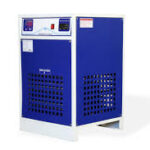Water Cooled Chiller
Water Cooled Chillers are refrigeration systems that use water as a cooling medium to transfer heat away from the refrigerant. They are widely used in large-scale industrial and commercial applications where high cooling capacity and efficiency are required. Key components include compressors, condensers that transfer heat to water, cooling towers for heat dissipation, evaporators for absorbing heat from process fluids, and expansion valves to regulate refrigerant flow. These systems are known for their effectiveness in managing high cooling loads but require additional infrastructure for water circulation and cooling tower operation compared to air-cooled alternatives.

Water Cooled Chiller
Specification Details
Water Cooled Chiller
Performance on
- Efficiency: Water-cooled chillers generally operate with higher efficiency compared to air-cooled counterparts. This efficiency is primarily due to the superior heat transfer properties of water compared to air.
- Capacity: These chillers are capable of handling larger cooling capacities than air-cooled units. This makes them suitable for applications with substantial cooling requirements, such as large manufacturing plants, data centers, and commercial buildings.
- Reliability: Water-cooled systems tend to be more reliable in maintaining consistent cooling performance because they operate within a closed-loop system. This reduces the impact of external environmental factors, such as ambient temperature fluctuations, on their efficiency.
- Environmental Conditions: These chillers are less affected by ambient air temperature variations compared to air-cooled units. They can maintain efficient operation even in hot climates, where air-cooled systems may struggle to dissipate heat effectively.
Water Cooled Chiller
Advantages on
- Energy Efficiency: The superior heat transfer efficiency of water-cooled chillers results in lower energy consumption and operating costs compared to air-cooled systems. This efficiency is especially advantageous in applications with high cooling loads and continuous operation.
- High Cooling Capacity: These chillers can efficiently handle large cooling capacities, making them suitable for industrial processes, large commercial buildings, and facilities with substantial cooling requirements.
- Environmental Impact: Water-cooled chillers can contribute to lower greenhouse gas emissions compared to air-cooled systems, primarily because they consume less electricity due to higher efficiency.
- Reliability and Consistency: They offer reliable and consistent cooling performance, maintaining stable process temperatures and ensuring operational continuity even under varying environmental conditions.
Other Chiller Products We Manufacture
Air Cooled Chiller
Air-cooled chillers are refrigeration systems that use air to dissipate heat from the coolant or refrigerant. Unlike water-cooled chiller, which rely on a water source and cooling towers
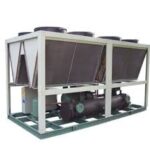
Screw Chiller
Screw Chillers are a type of refrigeration system used for air conditioning or industrial cooling applications they operate using screw compressors
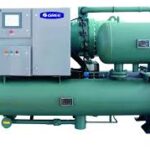
Variable Speed Chiller
Variable Speed Chillers are refrigeration systems equipped with compressors that have variable frequency drives (VFDs). These drives enable the compressor motor to adjust its speed according to the cooling load demand.
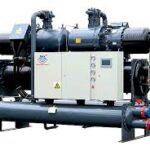
Oil Chiller
Oil Chiller are refrigeration systems designed to control and maintain the temperature of lubricating oil used in industrial machinery and processes. They ensure that the oil remains within a specified temperature range
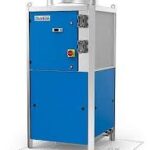
Hydraulic Oil Chiller
Hydraulic Oil Chillers are specialized refrigeration systems designed to cool and maintain the temperature of hydraulic oil used in hydraulic systems. They ensure that the oil remains within a specified temperature range
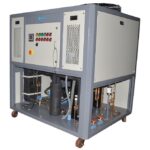
Online Chiller
Online Chiller is a refrigeration system designed to provide continuous cooling for industrial or commercial applications. It is equipped with capabilities for remote monitoring and control through internet connectivity
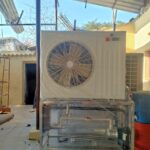
Glycol Chiller
Glycol Chiller is a type of cooling system that uses a glycol-water mixture as the coolant to remove heat from a process or equipment Glycol chillers are commonly used
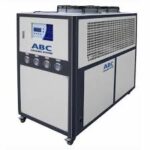
Spindle Chiller
Spindle Chiller are specialized cooling systems designed to manage the temperature of the spindle in machinery, such as CNC (Computer Numerical Control) machines.
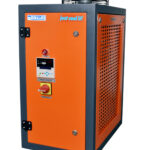
Refrigerated Air Dryer
Refrigerated Air Dryer is a type of device used in compressed air systems to reduce the moisture content of the air. It operates by cooling the compressed air to a temperature where water vapor condenses into liquid water.
